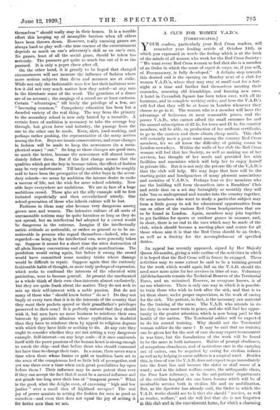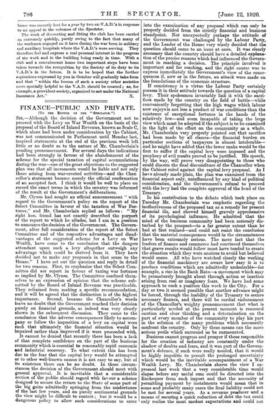Y OUR readers, particularly your Red Cross readers, will remember your
leading article of October 11th, in which you expressed in words the feeling which is at the back of the minds of all women who work for the Red Cross Society: " We want every Red Cross woman to feel that she is a member of an Order in which the sense of esprit de corps, or, if you will. of Freemasonry, is fully developed." A definite step towards this desired end is the opening on Monday next of a club for women V.A.D.'s, where they may stay at small cost for a fort- night at a time and further find themselves meeting their comrades, renewing old friendships, and forming new ones; A hotel in Cavendish Square has been taken over, with all its furniture, and in complete working order, and here the V.A.D.'s will feel that they will be at home in London whenever they choose to go to it.. The woman who is a member will have the advantage of bedrooms at most reasonable prices, and the poorer V.A.D., who cannot afford tho small entrance fee and the annual subscription of £2 2s. for town and £1 Is. for country members, will be able, on production of her uniform certificate. to go to the canteen and there obtain cheap meals. This club will certainly meet a great want among the country Red Cross members, for we all know the difficulty of getting rooms in London nowadays. Within the walls of her club the Red Cross woman will feel that her Society, as well as making use of her services, has thought of her needs and provided her with facilities and amenities which will help her to enjoy herself in private life. But it is not only the private life of the V.A.D.'s that the club will help. We may hope that here will be the starting-point and headquarters of many pleasant associations and societies of V.A.D.'s. Perhaps four or five members who use the building will form themselves into a Ramblers' Club and settle that on a set day fortnightly or monthly they will take 'bus or underground and wander into the country together. Or some members who want to study a particular subject may form a little group to ask for educational opportunities from one or other of the various Red Cross headquarters that are to be found in London. Again, members may join together to get facilities for sports or outdoor games in summer, and, in short, there is no end to the uses which may be made of the club, which should become a meeting-place and centre for all those whose aim it is that the Red Cross should be an Order,. as well as a Society for the accomplishment of specified duties.
An appeal has recently appeared, signed by Her Majesty Queen Alexandra, giving a wide outline of the activities in which it is hoped that the Red Cross will in future be engaged. These activities may to some extent be said to be a training-ground for the work which would again fall on the V.A.D. should the need once more arise for her services in time of war. Voluntary Aid detachments remain the Technical Reserve of the Territorial Force, and an untrained Reserve, as everyone knows, is of no use whatever. There is only one way in which it is possible to train those who wish to look after the sick, and that is to let them share, under proper supervision, in the work of caring for the sick. The patient, in fact, is the necessary raw material for the training of the nurse. The V.A.D. who intends to do her duty in war must train in peace, and she will find her oppor- tunity in the greater attention which is now being paid to the health of the nation. The Territorial soldier will be expected to do his annual training. Why should not the Territorial woman soldier do the same ? It may be said that no training can be given her for the sort of case she may expect to encounter in war-time, but the foundations of the work will be found to be the same in both instances. Habits of prompt obedience, of scrupulous cleanliness, and of meticulous care in the carrying out of orders, can be acquired by caring for civilian infants as well as by helping to nurse soldiers in a surgical ward. Besides this, in time of war the V.A.D. does not expect to go immediately into the front line and become the sister or staff nurse of a ward ; and in the infant welfare centre, the orthopaedic clinic, the Poor Law infirmary, or in the out-patients' departments of the civilian hospital she can learn lessons which will be of invaluable service both in civilian life and on mobilization. But, as the Spectator has already said, the Order in which the V.A.D. works should see to it th3 t she should " receive, as well as render, welfare," and she will feel that she is not forgotten in this club and in the convalescent home, for which a charming house was recently lent for a year by two ex-V.A.D.'s in response to an appeal in the columns of the Spectator.
The work of decorating and fitting the club has been carried
• on extremely quickly, partly owing to the fact that many of the workmen engaged on it have during the war been in military and auxiliary hospitals where the V.A.D.''s were serving. They therefore feel and express a real personal interest in the progress of she work and in the building being ready in time. With a club and a convalescent home two important steps have been taken towards the recognition by the Society of its duty to its V.A.D.'s in the future. It is to be hoped that the further aspirations expressed by you in October will gradually take form and that " within the bosom of such a soeiety other soeieties more specially helpful to the V.A.D. should be created ; as, for example, a provident society, organized to act under the National







































 Previous page
Previous page